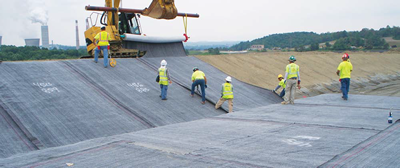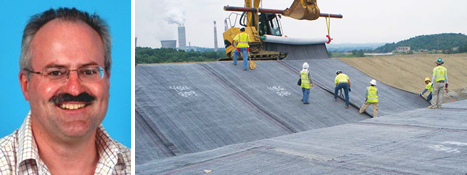 On October 17, Dr. Will Gates (SmecTech Research Consulting, Monash University) wrapped up some visits in the United States with a talk organized by the Minnesota Geotechnical Society (MGS). Gates, who lives and works in Australia, was born and raised in Minnesota and has become one of the foremost experts on clays, particularly as they are or can be utilized in geosynthetic designs and materials like geosynthetic clay liners (GCLs).
On October 17, Dr. Will Gates (SmecTech Research Consulting, Monash University) wrapped up some visits in the United States with a talk organized by the Minnesota Geotechnical Society (MGS). Gates, who lives and works in Australia, was born and raised in Minnesota and has become one of the foremost experts on clays, particularly as they are or can be utilized in geosynthetic designs and materials like geosynthetic clay liners (GCLs).
He is particularly adept at discussing how polymer modification to clay can enhance certain performance properties that subsequently can make the clay more specific to an engineered application or site.
Geosynthetic clay liners have been undergoing an R&D revolution, with all of their potential components advancing: geotextile covers/carrier properties, bonding techniques, special coatings, and now even modified bentonite.
These transformations are improving root barrier protection, reducing desiccation risk, enhancing chemical compatibility, and much more. With the addition of clay modification to the products, GCLs are now able to be offered efficiently at an application-specific orientation almost entirely unseen in other material classes.
To hear Gates talk, though, is to realize, rather quickly, how much one does not know about clays! The geotechnical engineering field works with clays often, but not quite from the same perspective and certainly not from the same depth.
GCL producers like CETCO, Geofabrics Australasia, and NAUE have done a fantastic job of sharing technical and practical information on GCLs—how they’re engineered, how they perform, why they are tested in the way they are, etc.; but, in general, when the geosynthetics field writes or reads about GCLs and the extraordinary swelling properties of bentonite embedded within them, it is rarely looking at a micro-level of understanding as to why and how the bentonite clay performs and responds the way it does.
That is the expertise Gates brings. And it is fascinating.

Some of his recent work which geosynthetics-related professionals may be interested in has involved QA/QC protocols for methylene blue and fluid loss methods; polymer modification of bentonite; quantifying GCL interactions with non-standard leachates; improving swell index of bentonite; and the effectiveness of polymers on attenuating sulfuric acid solution influence on the engineering properties of bentonite.
Dr. Gates earned his degrees in the United States and spent the early portion of his professional career here before taking up life and work on, what is for his colleagues back in Minnesota, the other side of the world. His talk with the Minnesota Geotechnical Society brought back some welcomed information and spurred discussion on the role clays and GCLs can and do play in mining, industrial and ore processing—all subjects close to engineers and regulators in Minnesota right now. The state is currently debating expanding its mining permits, such as to include greater copper and nickel development, but there are strong concerns over environmental protection. Application-specific GCLs may help address a number of these engineering concerns.
Ahead of his stop in Minnesota, Gates took part in the 50th Anniversary Conference of the Clay Minerals Society in Champaign-Urbana, Illinois, where a number of papers were dedicated to geosynthetic clay liner applications and research. The 51st CMS conference will be held 17-21 May 2014 in College Station, Texas at Texas A&M University.
Will Gates is principal of SmecTech and a Senior Research Officer, Geomechanics & Structures Groups, with the Department of Civil Engineering at Monash University. His MGS talk was arranged by John Allen (TRI Environmental).












